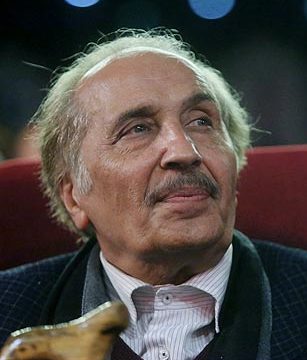Mohammad-Ali Sepanlou on:
[Wikipedia]
[Google]
[Amazon]
 Mohammad-Ali Sepanlou (محمدعلی سپانلو) (November 20, 1940 – May 11, 2015) was an Iranian poet, author, and literary critic. Born in
Mohammad-Ali Sepanlou (محمدعلی سپانلو) (November 20, 1940 – May 11, 2015) was an Iranian poet, author, and literary critic. Born in
 Mohammad-Ali Sepanlou (محمدعلی سپانلو) (November 20, 1940 – May 11, 2015) was an Iranian poet, author, and literary critic. Born in
Mohammad-Ali Sepanlou (محمدعلی سپانلو) (November 20, 1940 – May 11, 2015) was an Iranian poet, author, and literary critic. Born in Tehran
Tehran (; fa, تهران ) is the largest city in Tehran Province and the capital of Iran. With a population of around 9 million in the city and around 16 million in the larger metropolitan area of Greater Tehran, Tehran is the most popul ...
, Iran. He has been a founder member, a member of the executive board, and editor of the journal of the Writers’ Association of Iran, in which capacity has opposed both the former regime of Shah Mohammad Reza Pahlavi and the Islamic Republic of Iran
Iran, officially the Islamic Republic of Iran, and also called Persia, is a country located in Western Asia. It is bordered by Iraq and Turkey to the west, by Azerbaijan and Armenia to the northwest, by the Caspian Sea and Turkmeni ...
, speaking out against censorship.
Sepanlou received his diploma from Dar ul-Funun high school. He graduated from University of Tehran
The University of Tehran (Tehran University or UT, fa, دانشگاه تهران) is the most prominent university located in Tehran, Iran. Based on its historical, socio-cultural, and political pedigree, as well as its research and teaching pro ...
Faculty of Law in 1963.
Throughout his literary career, Sepanlou published over 60 books. His works have been translated into English, French, German, Swedish, Dutch, and Arabic.
Sepanlou also translated works of several renowned writers and poets, Jean-Paul Sartre
Jean-Paul Charles Aymard Sartre (, ; ; 21 June 1905 – 15 April 1980) was one of the key figures in the philosophy of existentialism (and phenomenology), a French playwright, novelist, screenwriter, political activist, biographer, and lit ...
and Albert Camus
Albert Camus ( , ; ; 7 November 1913 – 4 January 1960) was a French philosopher, author, dramatist, and journalist. He was awarded the 1957 Nobel Prize in Literature at the age of 44, the second-youngest recipient in history. His work ...
as well as Horace McCoy
Horace Stanley McCoy (April 14, 1897 – December 15, 1955) was an American writer whose mostly hardboiled stories took place during the Great Depression. His best-known novel is '' They Shoot Horses, Don't They?'' (1935), which was made into ...
, Yiannis Ritsos
Yiannis Ritsos ( el, Γιάννης Ρίτσος; 1 May 1909 – 11 November 1990) was a Greek poet and communist and an active member of the Greek Resistance during World War II. While he disliked being regarded as a political poet, he has b ...
, Arthur Rimbaud
Jean Nicolas Arthur Rimbaud (, ; 20 October 1854 – 10 November 1891) was a French poet known for his transgressive and surreal themes and for his influence on modern literature and arts, prefiguring surrealism. Born in Charleville, he start ...
, and Guillaume Apollinaire
Guillaume Apollinaire) of the Wąż coat of arms. (; 26 August 1880 – 9 November 1918) was a French poet, playwright, short story writer, novelist, and art critic of Polish descent.
Apollinaire is considered one of the foremost poets of t ...
into Persian. He took part in many literary seminars and conferences around the world, introducing Iranian culture and literature to writers, critics, and book-enthusiasts in other countries. His book "Pioneer Writers of Iran", which is a selection of literary works of 20th Century Iranian writers, along with his review of their works, is among the educational literary sources which are being taught in many universities in Iran. He also tried his hand at acting and appeared in films by Amir Qavidel, Nasser Taghva’ee and Ali Hatami. Sepanlou, with his poetry collections, not only wrote historical material about Teheran, but also created masterful poetry. Sepanlou was always a vocal supporter of freedom of speech and press freedom – he was very active on freedom of speech in particular. Sepanlou was definitely one of the people subject to censorship and one of those who suffered because of it. Some of his works were either not printed at all, or if they were, only in strictly censored form. But he never really gave up. Some of his works were printed abroad to evade censorship. However, there are also a few works that Sepanlou wrote but that haven't been published to this day. In one of his latest interview he complained about the situation and said he was considering giving up writing entirely.
He died in Tehran in 2015.
Awards
Sepanlou was awarded the FrenchLegion of Honour
The National Order of the Legion of Honour (french: Ordre national de la Légion d'honneur), formerly the Royal Order of the Legion of Honour ('), is the highest French order of merit, both military and civil. Established in 1802 by Napoleon ...
and the Max Jakob Memorial Award The Max Jakob Memorial Award recognizes an 'eminent scholarly achievement and distinguished leadership' in the field of heat transfer. Awarded annually to a scholar by the American Society of Mechanical Engineers (ASME) and the American Institute ...
for his scholarly and literary achievements.
References
{{DEFAULTSORT:Sepanlou, Mohammad-Ali 20th-century Iranian poets Iranian literary critics Recipients of the Legion of Honour Writers from Tehran University of Tehran alumni 1940 births 2015 deaths 20th-century poets Iranian male poets 20th-century male writers 21st-century Iranian poets Poets from Tehran